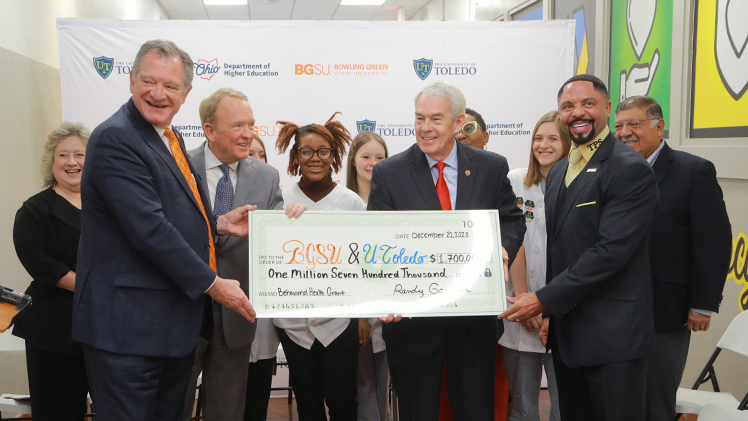Facing a shortage of mental health professionals across the state, Chancellor Randy Gardner of the Ohio Department of Higher Education announced a $1.7 million grant to be shared by Bowling Green State University and The University of Toledo to collaboratively attract and support more students entering the behavioral health field.
During a press conference at the Toledo Public Schools Pre-Medical and Health Science Academy Thursday, Dec. 21, Chancellor Gardner announced the Behavioral Health Workforce Expansion Program to strengthen, grow, and build the behavioral health workforce in Ohio.
Together, BGSU and UToledo will implement a comprehensive plan to address behavioral health workforce needs in the state, focused on education programs, trainings, and scholarships.
“Governor DeWine has made mental health support a top priority for the state, and I commend Bowling Green and UToledo for working together to address this need in the region,” Chancellor Gardner said. “I am grateful that these two universities came together in such a meaningful way.”

Ohio Chancellor Randy Gardner holds a check to celebrate the grant and partnership with, from left, BGSU President Rodney Rodgers, UToledo President Gregory Postel and TPS Superintendent Romules Durant.
The universities will look to attract high school students, students from related majors, and professionals from related disciplines. Money from the grant will support scholarships of up to $10,000 to recruit and retain students in such programs as marriage and family therapy, mental health counseling/counselor, social work, and substance abuse/addiction counseling.
Additionally, BGSU and UToledo will look to offer in-person and online micro-credential and certificate programs to further support workforce needs.
The funding will also establish a certified peer-to-peer supporter certificate program, professional development opportunities to expand the behavioral health workforce and upskill existing providers, provide mental health first aid training, and expand partnerships with federally qualified health centers and community behavioral health providers in underserved areas.
“There is a significant need for behavioral health professionals across our region and state,” BGSU President Rodney K. Rogers said. “This grant, in collaboration with The University of Toledo, will help us develop and support professionals in this field, directly benefitting our communities and those in need. As a public university for the public good, this is the very heart of our mission and we thank the Ohio Department of Higher Education and Chancellor Gardner for their support.”
“UToledo and BGSU are well positioned to lead this effort to address a critical need for mental health support in northwest Ohio,” UToledo President Gregory Postel said. “I look forward to our collaboration so that we can successfully expand access to our existing programs and identify additional opportunities to train a growing behavioral health workforce to best serve our community.”
Several local K-12 school districts, including TPS, and behavioral health centers provided letters of support for the initiative, citing a shortage of mental health professionals and a growing need for additional services for students and patients.
“The need for additional mental health professionals is growing – we are seeing the need increase across our district,” TPS Superintendent Dr. Romules Durant said. “Students are dealing with issues both at school and in their personal lives and the support mental health professionals can offer would certainly be beneficial in helping them cope with any challenges they might be facing.”
TPS will work closely with the BGSU/UToledo Behavioral Health Workforce committee to encourage its students to enter the in-demand field.
The newly established committee will begin meeting after the first of the year, with implementation scheduled for early 2024.